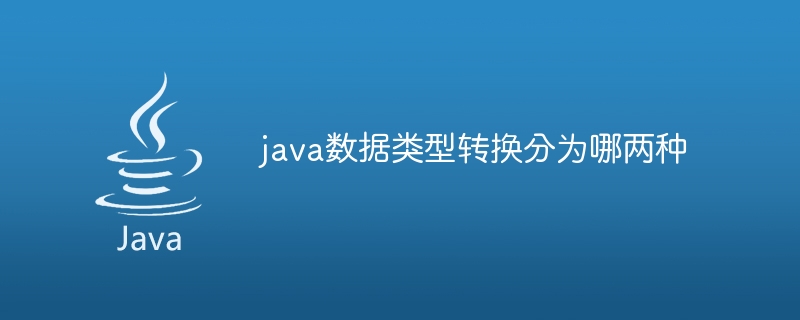Home >Java >javaTutorial >What are the two types of java data type conversion?
What are the two types of java data type conversion?
- 百草Original
- 2024-01-29 14:54:071014browse
Java data type conversion is divided into: implicit type conversion and explicit type conversion. Detailed introduction: 1. Implicit type conversion occurs when two data types are compatible. The compiler will automatically perform the conversion without requiring the programmer to perform manual operations. This conversion is completed automatically and does not require the programmer to perform explicit type conversion. 2. Explicit type conversion occurs when the two data types are incompatible. The compiler cannot automatically complete the conversion and requires the programmer to perform manual operations. This conversion requires the programmer to use a forced type conversion operator. Explicit instructions, etc.

The operating system for this tutorial: Windows 10 system, DELL G3 computer.
Java data type conversion is mainly divided into two types: implicit type conversion (also called automatic type conversion) and explicit type conversion (also called forced type conversion).
1. Implicit type conversion (automatic type conversion)
Implicit type conversion occurs when two data types are compatible, and the compiler will automatically perform the conversion. , no manual operation is required by the programmer. This conversion is done automatically and does not require explicit instructions from the programmer. For example, when a smaller range data type is assigned to a larger range data type, the Java compiler automatically performs implicit type conversion.
For example, when a variable of type int is assigned to a variable of type byte, the compiler will automatically convert the value of type int to a value of type byte. This is because the byte type has a small range and can only represent integers from -128 to 127. If the value of the int type exceeds this range, overflow will occur.
2. Explicit type conversion (forced type conversion)
Explicit type conversion occurs when two data types are incompatible and the compiler cannot automatically complete it Conversion requires manual operation by programmers. This conversion requires the programmer to use a cast operator for explicit instructions. For example, when a larger range of data types is assigned to a smaller range of data types, if the compiler cannot automatically complete the implicit type conversion, the programmer needs to use a cast operator to give explicit instructions.
For example, when a double type variable is assigned to an int type variable, the compiler cannot automatically convert the double type value to an int type value, because the double type has higher precision and may contain decimal part. At this time, the programmer needs to use a forced type conversion operator to give explicit instructions.
It should be noted that when performing explicit type conversion, precision loss or overflow may occur. Therefore, before performing an explicit type conversion, the programmer needs to ensure that the range of the target data type can accommodate the value of the source data type to avoid incorrect results or program crashes.
In Java, you need to pay attention to the following points when performing data type conversion:
1. When a smaller range of data types is assigned to a larger range of data types, Java will automatically Perform implicit type conversion.
2. When a larger range of data types is assigned to a smaller range of data types, if the compiler cannot automatically complete the implicit type conversion, the programmer needs to use a forced type conversion operator to perform explicit type conversion. instructions.
3. Before performing explicit type conversion, programmers need to ensure that the range of the target data type can accommodate the value of the source data type to avoid incorrect results or program crashes.
4. When performing data type conversion, you need to pay attention to precision loss or overflow. For example, when converting a double type value to an int type value, the decimal part will be truncated; when converting a long type value to an int type value, overflow may occur.
The above is the detailed content of What are the two types of java data type conversion?. For more information, please follow other related articles on the PHP Chinese website!

